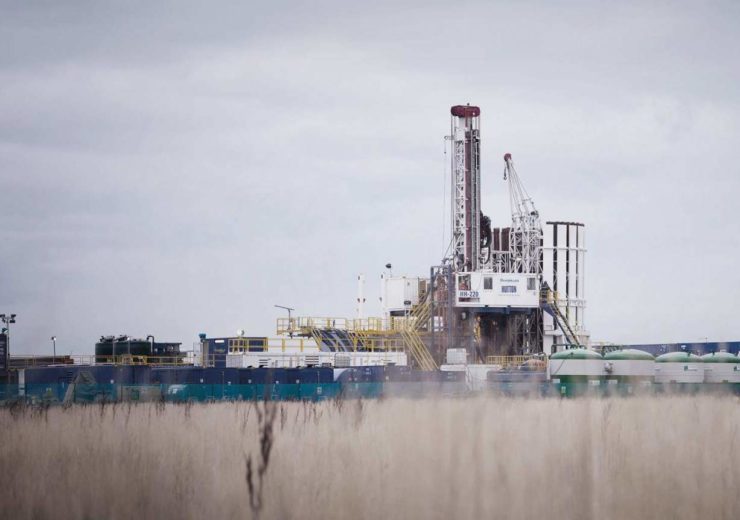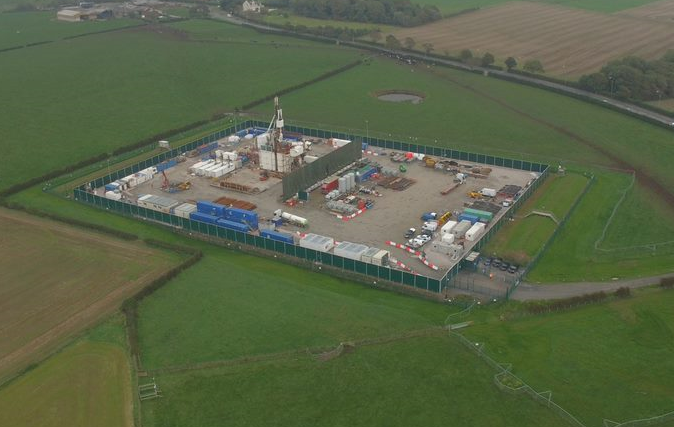Campaigners have pushed Westminster to publish the 2016 fracking report for almost two years via freedom of information requests - and its contents reveal misgivings over the industry's future prospects

Cuadrilla has operated a controversial fracking site in the UK at Preston New Road since 2017 (Credit: Cuadrilla)
Following a protracted legal dispute, the UK government has released an internal report on the state of the country’s fracking industry – although much of it is unreadable due to being heavily redacted.
Publication of the 2016 document comes after Whitehall failed to comply with a court-imposed deadline of 25 November, with lawmakers having decided it was in the public interest for its contents to be made available.
Despite significant censorship – more than three-quarters of the pages are fully blacked out – the document reveals concerns within Westminster over the “low public acceptance of shale” due to safety and environmental issues, and the existence of renewable alternatives.
It also alludes to “uncertainty” over the extent of the viability of domestic fracking, strengthening claims that the potential of the UK industry has been significantly overstated.
Last month, the Conservative government placed a moratorium on hydraulic fracturing in the UK, following a series of seismic tremors around the Cuadrilla fracking site in Lancashire, England – the only operation to have made significant progress in the country.
Weeks earlier, the National Audit Office – Westminster’s own internal watchdog – had released its own review of the management of the UK shale gas industry, in which it painted a picture of sluggishness and policy uncertainty, despite almost £33m ($43m) of public funds having been pumped into the sector since 2011.
UK government report on fracking arrives – but is heavily censored
The Greenpeace investigative unit Unearthed has been lobbying the government to publish the report – which surveys the hydraulic fracturing landscape as it stood in 2016, and forecasts the state of the industry up to 2025 – since early 2018 under the Freedom of Information Act.
The campaign has now finally borne fruit, although the heavy redaction throughout the 48-page report has triggered frustrations at the extent of the government’s opacity on the issue.
Greenpeace head of politics Rebecca Newsom said: “Looking at this black wall of redacted pages, people will be wondering why there’s so little the government is willing to reveal about fracking and so much it wants to hide.
“If ministers have really dropped their support for this polluting industry, why not publish this report in full and come clean about what’s been going on behind closed doors for years?”
Here’s the government’s secret fracking report we’ve been fighting nearly 2 years for (wait for the punchline) https://t.co/zNTIS6bCSz pic.twitter.com/ORdPSP97YL
— Unearthed (@UE) December 3, 2019
It has been suggested that prospects for the UK’s shale gas industry have previously been overstated – with government projections overly optimistic despite information that fracking operators were not convinced by the industry’s potential.
The report appears to provide some support for this claim, citing interviews with industry stakeholders over the long-term credibility of fracking in the UK, in which it is suggested operations could “close down quickly” if early sites are not successful.
It states: “The development of the UK shale industry over the next five to 10 years is subject to great uncertainty – most importantly because the viability of the UK shale reserves is not yet proven.
“Developments in the next five to 10 years are therefore crucial to establish long-term viability of the industry.”
UK policymakers planned public charm offensive to boost image of fracking
The report also reveals the Cabinet Office’s approach to addressing meagre public support for the industry – identifying a communications strategy for the former Department for Energy and Climate Change (DECC) to develop a pro-shale narrative as a key tool.
It states the DECC would embark on “crucial work on communications to increase public acceptability of shale”, including the development of a “pro-shale national/regional narrative” and the support of “shale champions”.
The slow workings of local planning systems were also blamed for inhibiting the industry, dissuading fracking operators from more aggressively pursuing new developments.
The report states: “Operators highlight that the most significant barriers by far are the long decision timelines and uncertainty experienced in local planning system.
“Current and future operators stress that they will only bring forward large sites if current long planning times and perceived uncertainty is reduced – ie unless this can be resolved, UK shale will not take off even if geology proven.”
Trade body says ‘steady pace’ of UK shale gas development is natural for the industry
Ken Cronin, chief executive of trade organisation UK Onshore Oil and Gas, has dismissed questions over the fracking industry’s long-term viability, arguing that “the case for UK shale gas development is stronger than ever”.
He said: “This 2016 report reveals no new information of interest. It is true that shale gas development in the UK has progressed at a steady pace, although this is commensurate with the exploratory and highly-regulated nature of the industry.
“Since this report was released, the first hydraulic fracturing since 2011 has taken place, several sites have been constructed and tested across North Nottinghamshire, and multiple planning applications have been submitted for further exploratory work across Derbyshire and Lancashire.

“As with any industry that involves development, our progress has been slowed by the local planning system.
“This is not a unique problem to shale within the energy sector – onshore wind and solar have met with comparable delays where applications have been filed.”
Fracking becomes political issue ahead of UK election
Last month, the Department for Business, Energy and Industrial Strategy (BEIS) – which replaced the DECC – announced a temporary ban on shale gas extraction in the UK, following a regulatory investigation into seismic activity caused by fracturing at the Preston New Road site operated by Cuadrilla.
Ahead of the UK general election later this month, the Conservative Party manifesto states that support for the industry will not be reinstated until such time as “the science shows categorically that it can be done safely” – but Greenpeace has called for a permanent ban.
The UK Labour Party has dismissed the moratorium as a cynically-timed election stunt, and pledged in its own manifesto to bring an end to all fracking in the UK.
Labour’s shadow cabinet minister Jon Trickett said: “This report clearly shows that the Tories have bent over backwards to serve the interests of big business, especially the oil and gas industry.
“They have taken money from oil executives, trashed the rights of communities and enabled fracking companies to threaten their local environment.
“The fact they have tried to cover this up by redacting pages of critical information further illustrates this government’s contempt for the public.
“Labour will ban fracking, expand the Freedom of Information Act and introduce tough new transparency rules.”
